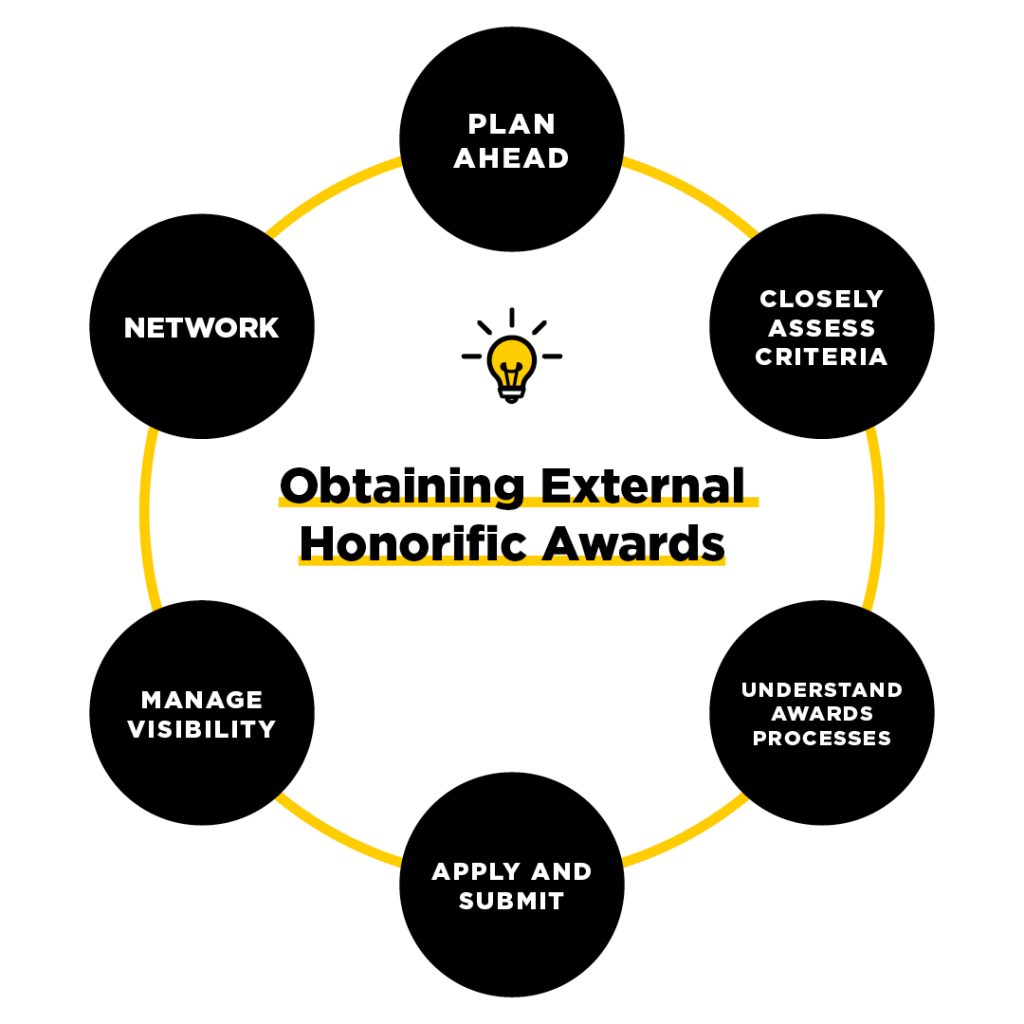Faculty Excellence assists faculty members to identify and apply for suitable honorific awards from early career to lifetime achievement. Many awards may be available to pursue depending on the discipline and a faculty member’s achievements.
For inquiries or guidance, reach out to Faculty Excellence at FacultyExcellence@ucf.edu.
Below are tips to consider when seeking external honorific awards.

Network
Developing a scholarly network of colleagues is important. For many awards, nominations from previous award recipients are required as part of an application. Accordingly, maintaining professional relationships with colleagues and scholars within the same field, both inside and especially outside of UCF, will help you maintain a pool of potential nominators.
Plan Ahead
Even if you are not immediately applying for an award, examine the application requirements early. This also provides time to contact nominators if needed, gather references and compile other components of the application packet, which can be very extensive.
Closely Assess Criteria and Ensure Application Packet is Complete
Start with closely noting the criteria for each award and also consider the application requirements, which vary by award and discipline. For example:
- Creative disciplines may require more detailed responses and longer letters
- STEM awards may be more narrowly focused with shorter letters in some cases
- Determine the style expectations for the award and align your approach with them
- Overall, remember that clear and focused writing usually succeeds
As William Strunk Jr.’s The Elements of Style suggests, consider:
- Brevity
- Clarity
- Flow
- Simplicity
- Unity
Also, many disciplines have “award ladders.” Applicants start with entry-level awards and work up to more prestigious and highly prestigious awards, which can help them qualify and obtain honors from the National Academies.
Understand the Awards Process
This seems trivial, but carefully read the application and reference instructions. Ignoring what may seem like minute details can minimize your chances for consideration and success.

Award Details
- What the award seeks to honor
- What sort of excellence is being recognized
- Opening date for applications
- Submission deadline
Winner Profiles
- View application packets of previous award winners (if possible)
- Note career age, career stage and specific discipline/area(s)
Nomination Requirements
- What the award nomination must have
Submission Specifications
- How to submit the nomination, application and references
- Document type: email, PDF, etc.
- How references are to submit their letter(s)
Understand the award “pillars”
- Avoid the mistake of addressing only one “focus” area and ignoring the other connecting areas
- Be sure to address all pillars
Example of Award Application Pillars
In this graphic, an award may require excellence in economic development, but the connecting areas may also list:
- Responsibility
- Quality
- Vision
- Service
In this case, the applicant must address all five pillars, with economic development being at the core.

Beyond the Pillars
- Be very clear about what the candidate did to deserve the award
- List the accomplishments and contributions
- Explain the value the applicant brought to each program and project, as well as the impact of the work
Apply for and Submit the Award
- Gather all components of the application packet at least 4-5 months before the deadline
- Consider who will serve as the nominator and as references based on the specifications and award criteria
- It is common for notable awards to require a curriculum vitae
- Updated and current
- Written for a general audience outside of the applicant’s circle
- Crafted for “instant intake”
- Think elevator pitch
- Five pages, not 50
- Highlight important award-centric elements
- Include a career summary with notable accomplishments and important publications
- Plan to submit the application/nomination at least 1-2 weeks prior to the deadline
References
Note there may be rules against or limits for internal references. Strongly consider engaging references outside of UCF and those with prominence.
- Do not wait until last minute to ask for a reference
- The more renowned the reference, the more time they need to compose a letter
- Their prominence also increase the possibility they may decline the request
- Have a backup plan
- Submit reference letters on letterhead with signatures and do not deviate from the instructions provided by the award organization
Manage Visibility

Applicants typically compete on a wider scale with a larger class of nominees. As such, the awards panel is also much broader; members may not know or have heard of the applicant.
The award panel’s perception is based on:
- The award application packet
- The applicant’s web presence
Create and use a web presence as an advantage.
- Keep webpages updated
- Organize them based on the most recognized nomination criteria:
- Contributions
- Impacts
- Publications
- Awards
- Google the applicant’s name with keywords (because reviewers Google applicants)
- Review Google Scholar
- Ensure LinkedIn and Wikipedia references are updated and accurate
- Review any public social media pages

Have You Earned An Award?
Report your award to be highlighted in Faculty Excellence and UCF news publications!
